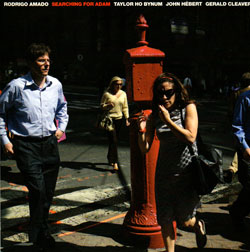
"Searching for Adam," the phrase, is saxophonist Rodrigo Amado's personal terminology for the search for oneself, or himself, his voice in his music. Already an accomplished musician and bandleader, as well as a photographer, the search for self wouldn't seem to be a hurdle he'd still be facing. But at the same time, the search for self isn't a quest that ends, not if taken seriously. And Amado is a serious musician. He could without too much difficulty be likened to the composerly end of the 1960s free jazz explosion, players like Archie Shepp and Rahsaan Roland Kirk who never entirely abandoned the idea of preconceived structure.
Searching for Adam the album is the New York chapter (or the first, such is yet to be seen) of Amado's quest. Although recorded in his native Lisbon in 2008, the band he assembled for the studio session was comprised of American visitors: Taylor Ho Bynum on cornet and flugelhorn, bassist John Hébert and drummer Gerald Cleaver. The track titles evoke the city ("4th Avenue, Adam's Block") or aspects of searching ("Newman's Informer," "Waiting for Andy") and the music within has a feeling of a team, perhaps not all well-acquainted, but certainly all dedicated to a common cause and working with the assurance that they can achieve it. It's confident and, yes, searching at the same time. Even the cover photo shows people rushing in different directions on a city street, one of New York's telltale decommissioned emergency call boxes taking center stage.
While Amado convened the session, five of the six pieces here are group improvisations (which doesn't contradict the claims of the first paragraph, it just reinforces his hand as bandleader). "Pick Up Spot," Cleaver's three-minute drum solo, rounds out the set with a city-street feel of controlled chaos. The idea of New York (or perhaps of Lisbon, London or Oslo) portrayed here is reminiscent of the New York of Paul Auster's novels: ever surprising but nothing happening without a reason. The music of Amado & Co. is exciting because their spontaneity is purposeful.
Comments and Feedback:
|



